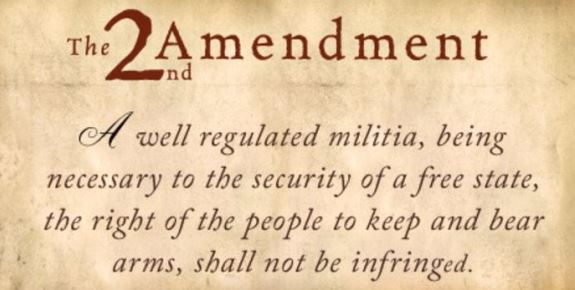
Good News – Bad News On Second Amendment Rights
The unalienable rights guaranteed by the Second Amendment have never been exercised more vigorously than they have during the Wuhan virus epidemic when record numbers of firearms have been sold. But at the same time, those rights have rarely been more vigorously attacked by anti-gun Democrats.
Citizens have been forced to go to court to protect those Second Amendment rights in the face of Democrats using the Wuhan virus panic to try to erode the absolute protections of the Second Amendment through so-called “emergency orders.” Those same orders have attempted to impose expansive business shutdowns and attempted to curtail other rights, such the right to assembly, speech and freedom of worship.
A court in Virginia and the Supreme Court have this week released decisions that are good news and bad news for gun owners and those wishing to preserve their Second Amendment-guaranteed rights.
In Virginia, an order issued by Lynchburg Circuit Judge F. Patrick Yeatts says federal and state protections on the right to bear arms outweigh any emergency authority held by Democratic Gov. Ralph Northam to order the gun range closed.
Glock pistol aficionados will recognize SafeSide, the plaintiff in the lawsuit, as the home of numerous Glock Sport Shooting Foundation matches. The SafeSide gun range in Lynchburg filed the lawsuit challenging the governor’s executive order, along with Gun Owners of America, the Virginia Citizens Defense League and the Association of Virginia Gun Ranges.
Attorney General Mark Herring’s office had argued that Northam’s emergency powers to protect public safety during a pandemic should be upheld.
Yeatts, though, said state law limits the governor’s power to regulate guns even in an emergency. He said Virginia’s Constitution includes language that parallels almost exactly the Second Amendment.
“The Governor appears to argue that, when he declares a state of emergency, he can ignore any law that limits his power, even laws designed to limit his powers in a state of emergency,” Yeatts wrote according to reporting by our friends at NewsMax.
NewsMax reports Philip Van Cleave, president of the Virginia Citizens Defense League, said he is happy the SafeSide range can open, but disappointed the order does not govern gun shops and ranges throughout Virginia. He said his group is talking with lawyers about the best way to get a broader ruling that would apply statewide.
Meanwhile, at the Supreme Court in Washington, DC, gun owners were dealt a setback in long running litigation unrelated to the Wuhan virus.
Yesterday, the Supreme Court declined to wade into a Second Amendment gun case it heard months ago after New York City modified the law in question to address the plaintiffs’ concerns, reports UPI.
The case was brought by the New York State Rifle and Pistol Association against the New York City law, which barred licensed gun owners from taking firearms outside the city or to a second home elsewhere in the state. The city subsequently amended the statute to rescind the restrictions and state lawmakers later barred them from returning.
The National Rifle Association had hoped the court would strike down the law, which would have expanded gun rights. The Supreme Court heard arguments in the case in December.
The high court said it refused to rule on the case because the city did precisely what the plaintiffs asked for.
“The State of New York amended its firearm licensing statute, and the city amended the rule so that petitioners may now transport firearms to a second home or shooting range outside of the city, which is the precise relief that petitioners requested in the prayer for relief in their complaint,” the majority wrote in the unsigned opinion.
“Petitioners’ claim for declaratory and injunctive relief with respect to the city’s old rule is therefore moot.”
Of course the reason New York changed its rules was they figured they were going to lose at the Supreme Court and they didn’t want to face the potential liability, or have a Supreme Court decision on the books that could be used to impeach other attempts to put limitations on the Second Amendment.
Perhaps seeing through that ploy, conservative Associate Justice Samuel Alito argued in dissent that the court should have acted with a ruling to make it clear the New York law infringed on the Second Amendment right to bear arms.
“At a minimum, if petitioners succeeded on their challenge to the travel restrictions, they would be eligible for nominal damages,” he wrote. “When a plaintiff’s constitutional rights have been violated, nominal damages may be awarded without proof of any additional injury.”
The high court voted 6-3 to stay out of the case, with Chief Justice Roberts and Associate Justice Kavanaugh disappointing conservatives by voting to drop the case. To some extent conservatives should not have been surprised by the ruling, given Roberts’ well known propensity to use procedural grounds to avoid adjudicating controversial questions, but Kavanaugh’s position left many conservatives wondering why they fought so hard to get him confirmed.
However, Kavanaugh did offer-up a sop to conservatives in his one-page concurrence agreeing that the case was moot, but recognizing some of their concerns, in particular, whether lower courts are correctly upholding Americans’ right to keep guns for self-defense.
“The court should address that issue soon, perhaps in one of the several Second Amendment cases with petitions for certiorari now pending before the court,” Kavanaugh wrote.
George Rasley is editor of Conservative HQ.
Published with Permission of conservativehq.com